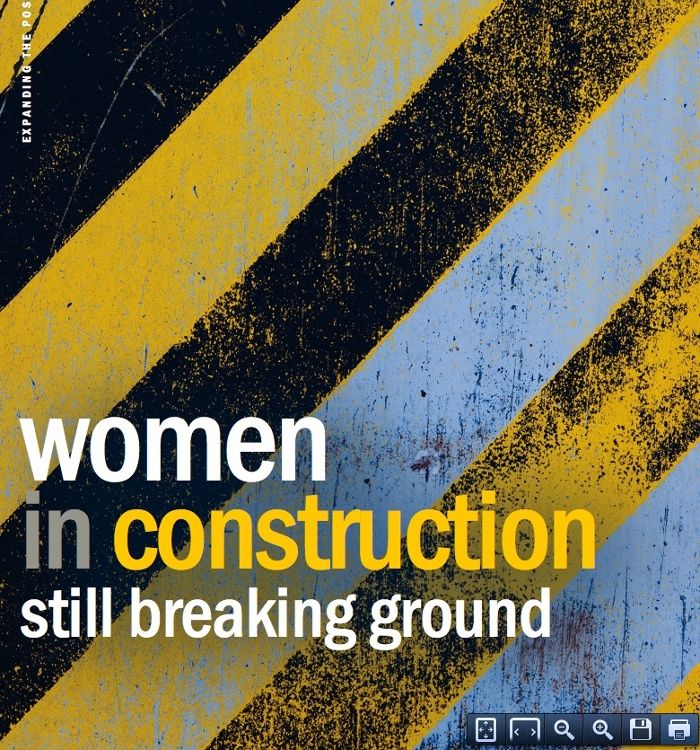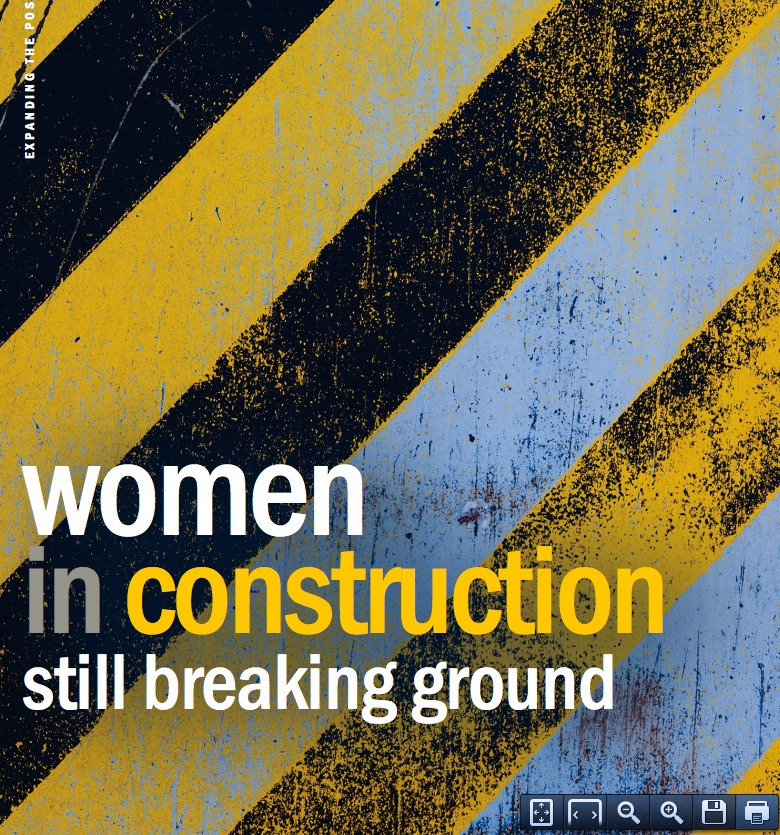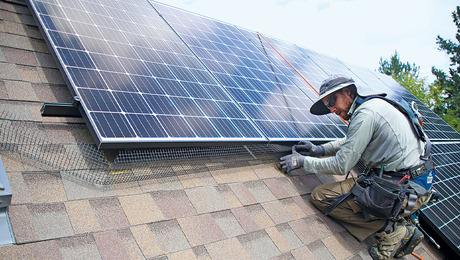
Women have made virtually no progress in breaking into the construction industry over the last three decades and now make up only 2.6% of the workforce, according to a new report from the National Women’s Law Center.
Despite gains in many other industries, there are 206,000 women working in construction compared to 7.6 million men. White, non-Hispanic women make up 2% of all construction workers; while Hispanic women account for 0.4%; African-American women 0.2%; and Asian/Pacific Islander and American Indian/Alaskan Native each at 0.1% of the total.
For all occupations, women make up 47.2% of the U.S. workforce.
Women make up just 1% of the country’s nearly 1.4 million carpenters, and 1.5% of the 727,000 supervisors of construction and extraction workers. Most seem to be in office positions rather than working in the field as skilled and unskilled labor where wages are higher.
“This concentration only serves to reinforce the notion that women belong in clerical, traditionally female positions, as oppose to physical, traditionally male, construction positions,” the report says. “And office clerks in the construction industry make less on average than construction laborers.”
Here are some other findings:
- Women are underrepresented in federal construction apprenticeships, and women also were less likely to complete their apprenticeships than men. Between 2006 and 2007, 51% of women left their apprenticeships compared with 46% of men. In carpentry apprenticeships, 70% of the women who were enrolled left.
- Women make less money than men in construction, $654 in an average week, or about 89% of the $736 paid to male workers. That’s better than the wage gap in other areas. In the workforce as a whole, women make 77 cents on the dollar compared with their male counterparts, a gap which adds up to $464,000 in a 40-year career. The disparity is even worse for Hispanic women and African-American women. The differences make construction jobs valuable for women workers.
- A variety of other “dirty and dangerous” jobs have shown much higher rates of growth for women workers than construction, including law enforcement, corrections, firefighting, and meat cutting.
The report also includes a number of personal accounts from women who were belittled and harassed on the job.
“I loved the work, but the hostility and discrimination I faced every day on the job shocked me,” one welder wrote. “On the construction site, men don’t see you as a plumber or as an electrician — they only see you as a woman who shouldn’t be there. They give you a hard time to press you to quit. Women are groped, grabbed, and relentlessly harassed. A lot of women leave the job before a year is out. It’s just too stressful.”
Fine Homebuilding Recommended Products
Fine Homebuilding receives a commission for items purchased through links on this site, including Amazon Associates and other affiliate advertising programs.

Reliable Crimp Connectors

Handy Heat Gun

Affordable IR Camera




























View Comments
This is a great article! Women should opt for more construction related jobs : )
Katy
According to my multi-decade career in the construction trades, this article contains a lot of B.S. feminist propaganda that has skewed statistical data and misguided reasonings.
To start, it seems to decide that it is the fault of men that there are so few women in the trades. The fact is that the trades are equally open to women but trades based manual labor jobs are simply less desirable to women. Don't blame it on the men in the field - blame it on parenting and societal norms instead. Sure, that can change but it takes some severe shifts in the social paradigm. Just look how long it has taken in less physical career fields.
Now, before anyone flies off the handle just because I hinted to the demanding physicality in the construction trades lets just be rational for a minute and consider the statistics of the issue. Fact: most construction trades require strength and/or stamina. While there are plenty of women out there who could certainly show up some many of the trades'men' there are statistically fewer women who could out lift a man's load. I am not being chauvinistic, I am just pointing out an often overlooked aspect of the issue.
The 'Personal Account' given was simply insulting to the trades in general and I am skeptical that it is even a true account. In my experience, women on job sites are treated much better than fellow male workers. Often the women will be given the "mother" role over male groups of workers or in some cases may become the "work wife" as a subtly dominant part of a work relationship. Never in all my years have I seen any of the hostilities toward a female worker as described.
In fact, women workers are treated so kindly on job sites that I believe it is the root of their lack of equal pay. The majority of business owners, foremen, project managers, crew leaders and job bosses that I have met are married men who have children of their own and are generally chivalrous in nature. In being so, I have noticed that women are treated differently. Less physicality is demanded of them. Mistakes are more easily overlooked. The lack of necessary skills is more allowed. Thus, the level of 'babying' provided lends to less responsibilities given and hence a lesser level of pay. Now, I am no scientist or statistition but that's my view of the situation based on years of first hand experience so take it for what it's worth.
I think promoting women in any career field great. But doing it in the way it is depicted in this article is purely despicable. For one last instance just look at the way they compare trade work to "law enforcement, corrections, firefighting, and meat cutting" jobs. With the possible exception of meat cutting, I don't think those are anywhere near comparable to say carpentry. Carpenters are not considered "heroes" by most nor do carpenters inherently carry a level of authority as an officer of any sort. It's apples to oranges and it's not going to help the disparity until we as a society can decide that skilled trades in general are honorable and respectable career fields instead of a fallback to college.
When the day comes that we finally realize that the guy (or gal) up in the steel risking his life and busting his butt in the sun, rain, wind and snow just to provide air conditioned offices for some desk jockeys is a hero of American industrialism and the everlasting symbol of "Made in America" then maybe we will see more women flocking to become a hero too.
DC
As a woman who has worked off and on as a carpenter for years I've had nearly all of the experiences described here: every thing from overly chivalrous or "Mom," to an idiot who asked me a few days ago "if I go on those women's liberation marches" when I stated a couple of facts that anyone with an IQ over room temperature could have said. Or an accomplished gentleman who pretended not to understand a quick sketch and continued the charade when in exasperation I finally handed him a printed out 3-D drawing from a manufacturer's website.
The only exception is being groped as anyone who knows me knows my skills with a saw plus my co-workers have my back just like I have theirs. After all I work just as hard as they do and respect is a two-way street.
At the end of the day I just love what I do and if the toxic testosterone gets to me I add another layer to an already thick skin.
Would love to see more women out in the field.
I'm a woman. I'm in construction. Been in construction for 20+ years. And i don't ride a desk! Own my own company. Although I've had a few women work for me over the many years, here or there, fact is women in the trades or who want to be in the trades are few and far between, so I have male employees. Wish I had women because we're so much more detail-oriented as a rule.
The occasional woman who's worked for me (generally as a sub or with a sub's company) has been white. Have yet to find a non-white woman who wants to work in construction... physically work. And that's just the way it's been. I know a few other women contractors and architects, but please find me some good women-power that Want to work and are willing to stay in for the long haul and send them my way.
As for discrimination against my sex, I don't think I've experienced it. Except in the early 50s in elementary school, when the school wouldn't let me take shop.
By the way... who wrote the "report"? anyone reliable? and who did they survey? etc.